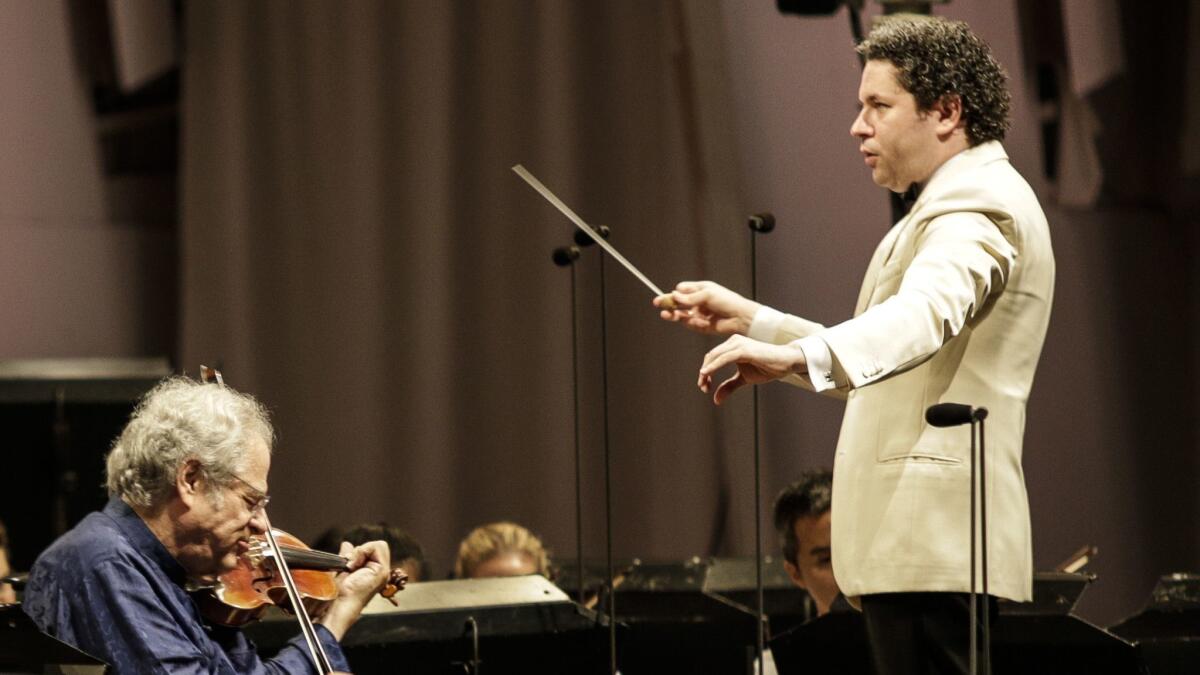Review: Itzhak Perlman shows his staying power at 50th Hollywood Bowl anniversary

Fifty Hollywood Bowl summers ago, Itzhak Perlman, 23 and already pegged to be the next great violinist, made his Los Angeles Philharmonic debut playing the Mendelssohn Violin Concerto.
To get an idea of what that might have been like, a recording of the concerto that Perlman made in London with André Previn four years later has been remastered and rereleased on CD with its hilarious original cover art intact. Wearing flowery, paisley shirts and sporting badly coiffed long hair, both musicians look like a couple of squares who had stopped off at Carnaby Street on their way to the Abbey Road studios. Wanna-be hippies rule. This is up there with the greatest violin recordings.
Perlman has since played the concerto at the Bowl with Previn, Zubin Mehta and Michael Tilson Thomas. And Tuesday night he was back to mark his half-century Bowl anniversary with the Mendelssohn again, this time with Gustavo Dudamel conducting the L.A. Phil.
The concerto has never been out of Perlman’s active repertory. I wouldn’t be surprised if he’s played it with every major orchestra in the world. Nor would I be surprised if he’s given many an inspired performance, like on that recording with Previn, or phoned it in, which he can also do. His interpretation has not changed very much, just his age, his celebrity (he’s the subject of a recent feature documentary) and his notoriously high fees.
That is to say that Perlman is a mixed-bag musician. He’s a figure of inspiration, not the least for being a polio survivor and an advocate of rights for the disabled. He has used his superstardom to promote the violin widely, classical music widely and himself widely. That’s all worked very well. The Bowl was practically full Tuesday, and he got a large, heartwarming standing ovation when he came onstage.
He had the audience’s back and the orchestra’s. He’s been a regular with the L.A. Phil for longer than any current member would be able to remember, and he appears often as a conductor as well as a soloist. He had Dudamel’s respectful support. He had his muscular finger memory from his thousands of times playing this most programmed of all violin concertos.
Even so, the odds were still against him. Next week he turns 73, which is late in the career for any violinist. Bow arms don’t last forever. But musicianship does, and that is where Perlman has been most disappointing. The greater his fame, the less he has seemed to grow as a musician in terms of imagination, curiosity or depth.
Fortunately for Perlman, the sound engineers had his back and seemed to sweeten and soften the amplification, the violinist’s unbelievably gorgeous tone and fabulous intonation being something of the past.
Shown up close on the big video screens, he could hardly escape the hard work of producing what had once seemed an effortless singing sensation for the concerto’s opening melody. During tricky fast passages, which he once made look like nothing at all, he now projects the self-satisfaction of showing he can still do it.
Yet, surprisingly, he still can — for the most part. As the performance progressed Perlman loosened up, and despite the now reedy tone and effortful intonation, you could sense the Perlman of legend. He also seemed to hit it off with Dudamel, who posted a charming video on Twitter of the two clowning around at the morning rehearsal, with Dudamel playing the opening of the concerto and Perlman conducting.
But at this stage of his career, Dudamel is nothing like Perlman, other than the fact that both musicians are devoted to education. At 37, Dudamel shows little danger of falling into the repertory rut that has characterized Perlman’s later career. Not when Dudamel has weeks like that last one.
Tuesday was Dudamel the classical traditionalist crowd pleaser. He devoted the second half of the concert to a relaxed, gracious performance of Beethoven’s Sixth Symphony, the “Pastoral,” that flowed as naturally as the mountain brook the second movement evokes. The performance further stood out for having the crystalline transparency of said stream.
Five days earlier, however, Dudamel could be found leading the L.A. Phil in strikingly vibrant performances of works from Argentina, Venezuela, Cuba and Mexico by, respectively, Alberto Ginastera, Antonio Estévez, Julían Orbón and Silvestre Revueltas, as well as Paul Desenne’s joyous Afro-Caribbean/John Strauss mish-mashed “Tritsch-Tratsch-Polka.”
That was followed by Dudamel accompanying a nearly 90-minute set by the irresistible, irrepressible 75-year-old Cuban salsa star Oscar D’León, who couldn’t convince the conductor to dance along with him onstage (the clock was running), but that did get two players from the orchestra to spontaneously and impressively cut the rug.
Over the weekend, it was the virtuoso Mexican guitar duo Rodrigo y Gabriela’s turn to join Dudamel. The Bowl was sold out Saturday night. The uncredited orchestral arrangements had a slightly ad-hoc character but not the performance, with the L.A. Phil augmenting Rodrigo’s soaring, Perlman-esque melodies and Gabriela’s whisking percussive accompaniments.
For today’s most versatile major conductor, even Itzhak Perlman is all in a remarkable day’s work.
More to Read
The biggest entertainment stories
Get our big stories about Hollywood, film, television, music, arts, culture and more right in your inbox as soon as they publish.
You may occasionally receive promotional content from the Los Angeles Times.











